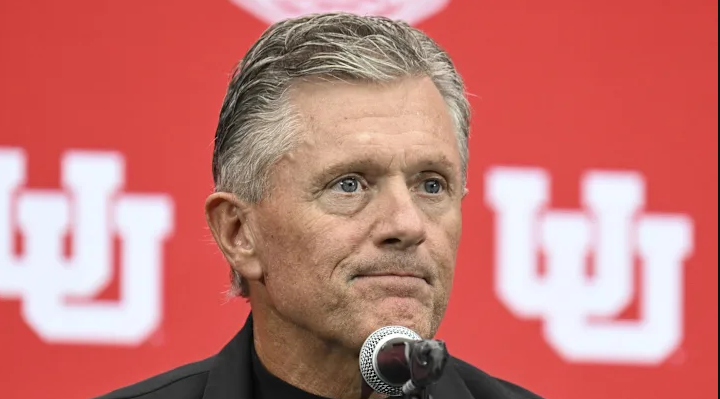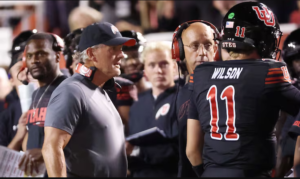
What Utah’s Kyle Whittingham said after loss to Arizona State

In the Arizona desert, the Utah Utes faced a harsh reality after suffering a disappointing 27-19 loss to the Arizona State Sun Devils. This game, marked by missed opportunities and critical injuries, sent shockwaves through a season that once held promise. As the No. 16 ranked team, the Utes entered the game with hopes of maintaining their College Football Playoff aspirations and vying for the Big 12 title. However, the weight of expectations proved heavy, and the Utes left the field burdened by a painful defeat.
Coach Kyle Whittingham, known for his forthrightness, reflected on the night with a sense of accountability. The spotlight inevitably fell on the performance of star quarterback Cam Rising, who struggled to find his rhythm after suffering a lower leg injury early in the game. Despite the injury, Rising showed immense grit, insisting on continuing to play, even while dealing with the limitations that his condition imposed. Whittingham acknowledged this tenacity, saying, “He’s a competitor. He felt very strongly that he wanted to stay in the game.” Yet, the reality was stark—Rising’s performance was compromised, and it was evident to anyone watching.
The game illustrated the complexities of athletic resilience. Rising’s determination to remain on the field was admirable but ultimately highlighted a broader issue within the Utes’ squad. The team’s execution faltered across the board, particularly on defense. Once a hallmark of Whittingham’s coaching philosophy, the defense appeared disorganized, struggling to maintain the discipline necessary to counter Arizona State’s offense. Running back Cam Skattebo took full advantage, accumulating 158 rushing yards and scoring two pivotal touchdowns. Whittingham did not shy away from addressing the defensive shortcomings, pinpointing a lack of execution in zone pressures. He stated, “We had guys out. The guys that are in there though have got to get the job done. The majority of those runs that popped were on zone pressures.”
This admission of failure underscored a recurring theme in Utah’s recent games: the inability to capitalize on crucial moments, particularly in the red zone. Whittingham openly took responsibility for these lapses, saying, “Blame me. I’ll take all the blame for the red zone.” Such a statement was not merely a gesture of accountability; it signaled the urgency of the situation. The Utes had faced similar challenges in previous outings, and this loss felt like a culmination of issues that had begun to surface in earlier games.
As the team prepares for a crucial matchup against TCU on October 19, the uncertainties surrounding Rising’s health loom large. The prospect of shifting to freshman backup Isaac Wilson raises questions about the Utes’ capacity to maintain competitiveness in the face of adversity. Whittingham hinted that Wilson could see significant playing time if the team’s struggles persist. The looming challenges of the Big 12, coupled with the pressure of two conference losses, create a sense of urgency that the Utes must address if they hope to salvage their season.
Looking ahead, the path forward for the Utes will require a rapid regrouping. The coaching staff will need to reassess strategies and reinforce fundamentals to ensure the team can compete effectively. Whittingham’s candid reflections serve as a foundation for what must be a determined effort to restore both confidence and execution. The blend of accountability and leadership he exhibited in the aftermath of the Arizona State game will be essential as the Utes seek to rebound and regain their footing in a competitive conference landscape.
In the wake of the loss, the atmosphere within the Utes’ camp is undoubtedly somber, yet there is a flicker of hope that with proper adjustments, they can turn their season around. The experience against Arizona State may serve as a wake-up call, forcing players and coaches alike to confront the hard truths of their performance. Whittingham’s emphasis on discipline, execution, and accountability will need to resonate throughout the squad as they prepare for a crucial stretch of the season.
The Utes’ journey ahead is filled with challenges, not only in terms of opponents but also within the ranks of their own team. Rising’s injury may have cast a shadow over the team’s outlook, but it also presents an opportunity for younger players to step up. This period could define the character of the Utes as they navigate through adversity. The development of Wilson, if called upon, will be critical—not just for this season, but for the future of the program.
Whittingham’s leadership will be put to the test in the coming weeks. The coach has a proven track record of guiding his team through tough situations, and this moment will require him to harness that experience. The lessons learned from the Arizona State loss should serve as a catalyst for growth rather than a source of despair. The challenge lies in transforming that learning into tangible results on the field.
Moreover, the support of the Utes’ fanbase will be pivotal. A passionate and loyal following can serve as a crucial motivator for the players as they strive to reclaim their momentum. The energy of the fans during home games can create an atmosphere that fosters resilience and determination, two qualities that the Utes will need in spades as they attempt to regroup.
As Utah shifts focus to TCU, the stakes will be high. Every game matters in the context of the Big 12 standings, and with the pressure mounting, the Utes must prioritize execution and discipline. Whittingham’s insights following the Arizona State loss serve as both a rallying cry and a call to action for his players. They must heed these lessons to ensure that the mistakes of the past do not continue to haunt their present and future.
The road to redemption is often riddled with obstacles, but it is also paved with opportunities for growth and resilience. The Utes have the talent and the coaching staff to turn their fortunes around, but it will require a collective effort, unwavering commitment, and a willingness to learn from adversity. The next few games will be critical in determining not only their season but the identity of this team moving forward.
However, Coach Whittingham’s post-game remarks encapsulate the challenges facing the Utah Utes in the wake of their loss to Arizona State. His willingness to take responsibility and address the shortcomings of his team reflects the kind of leadership that can inspire change. The Utes must now harness this moment, learning from the pain of defeat as they prepare for the battles ahead. With determination and focus, they can emerge from this difficult period stronger and more unified, ready to compete for their goals in the remainder of the season.

Leave a Reply